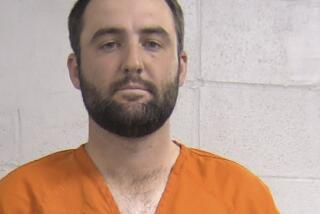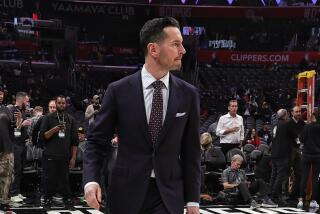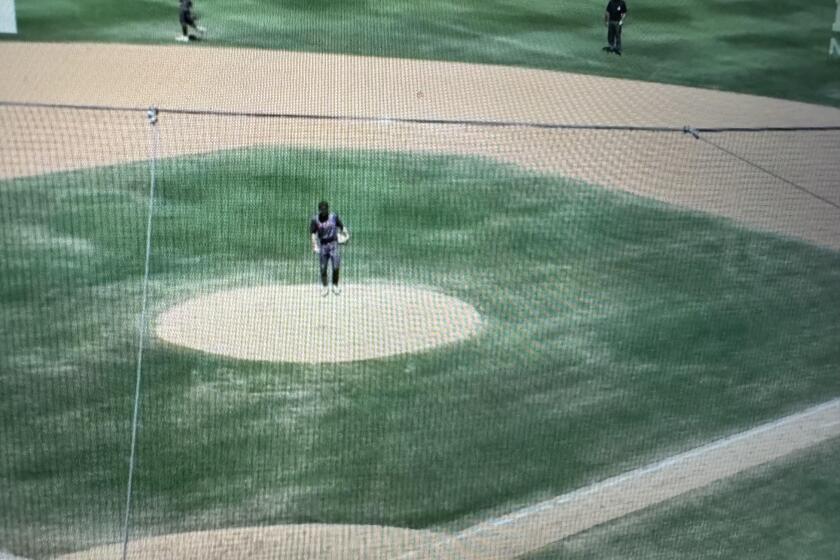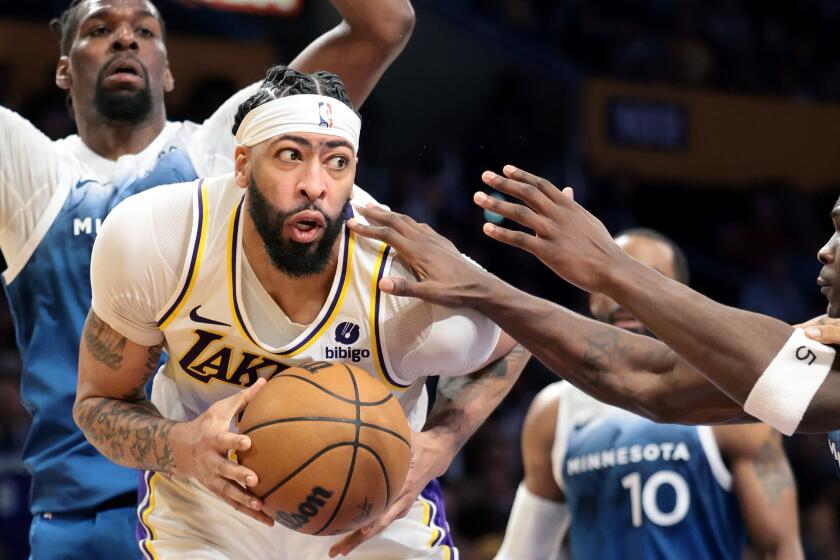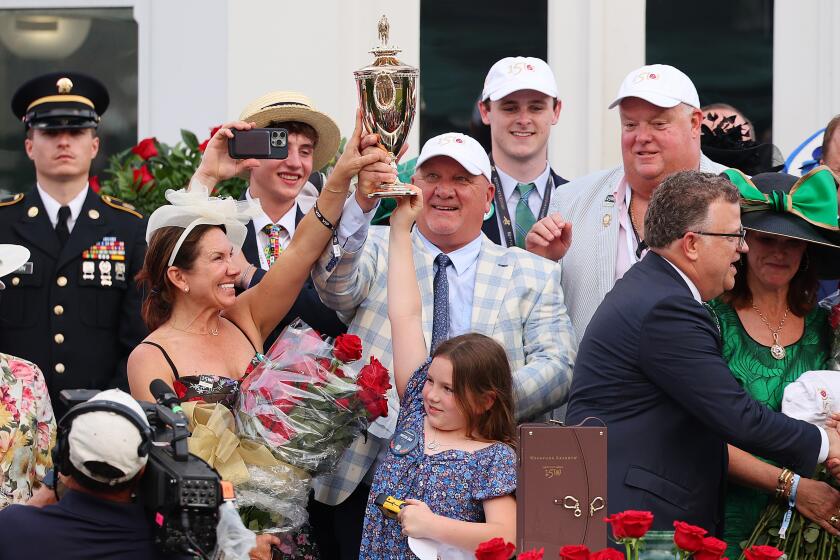Knight Watch
You again?
Yes, it’s Grant Hill, looking good in only his fourth comeback, which might be an unexpected bonus for the Orlando Magic but didn’t come a moment too soon for the NBA.
The whole league was already rooting for him before the outbreak at Auburn Hills. It wasn’t lost on anyone that the very next player of the week the NBA selected was Hill, its shining knight.
Of course, there are so many weeks and, as there could be only one Sir Galahad, there’s only one Grant Hill. They can’t clone him, so they’ll have to settle for the next-best thing, crossing their fingers for him.
Commissioner David Stern says he’s “absolutely” rooting for Hill. Detroit Piston boss Joe Dumars, whom Hill ran out on when he signed with the Magic, says he roots for him to make it back as much as anybody in the league.
“Grant is a genuinely good person,” Dumars said from Auburn Hills. “That’s why even if he chose to leave, you can still pull for him. You pull for good people.”
There were never many like Hill, because you had to be a superstar to qualify and a precious few, like Sandy Koufax, Wayne Gretzky and Tony Gwynn, were worthy of the Round Table.
In the ‘80s, the NBA had a whole league of them: Michael Jordan, Magic Johnson, Julius Erving, Isiah Thomas, Charles Barkley -- unless you tried his patience in a bar -- even Larry Bird, who went from a surly “hick from French Lick” to a beloved country humorist, like Will Rogers.
Hill, the last of the line, wasn’t simply a throwback, he went all the way back to the days when off-court income meant your second job in the off-season.
He couldn’t have been farther out of time. By the end of the ‘90s, with the NBA’s popularity mushrooming, Jordan had retreated to a splendid isolation and the money had begun flowing to teenage rookies, who regarded it as an entitlement.
For the young players, who were now so young, the game wasn’t the problem, but the life.
“In some respects, I’m amazed at how these young guys are able to handle themselves,” Hill says. “I came in with four years of college and it was an adjustment for me.
“Being from a high-profile program, playing on the national stage, in Final Fours, it was still an adjustment. When you throw in the free time, the money, the resources, the fame, all that combined in one and you’re 22 years old, that’s a dangerous combination.
“Now it’s even younger.... Whether it’s [Magic rookie] Dwight Howard or any of these young guys, whether they’re out of high school or a year or two of college, they’re able to come in and adapt, and in some cases excel and in some cases fail. But I’m amazed. I wasn’t even sure I was ready to go to Duke. Things have changed.”
Hill arrived in 1994 after appearing three times in the Final Four, the most ballyhooed rookie between Shaquille O’Neal (1992) and Tim Duncan (1997). As for handling the adulation and the demands that turned everyone inward, he was in a league of his own.
He was as generous as gracious, donating time to the Special Olympics and Habitat for Humanity. Four comebacks later, he hasn’t changed, answering the same questions night in and night out, as he did in his other three.
He’s still Grant Hill. It’s not because of the league’s image that everyone roots for him. It’s because he’s who he is.
Half a Dynamic Duo
Hill first hurt his left ankle in his last playoff series as a Piston in 2000 and underwent surgery two days later.
No one thought it was a big deal. He went onto the free-agent market as one of the big prizes. The Magic won his heart and went for the daily double -- his pal, Duncan.
They visited Orlando together, and were wined and dined together, or at least, fed. When Lon Babby, the agent for both, told a Magic official Duncan didn’t eat cold cuts, which had been set out in an airplane hangar to welcome him, they ran like the wind to get him something he liked: cheeseburgers.
Duncan went back to San Antonio, ready to leave. Teammate David Robinson flew back from Hawaii, implored him to stay and saved the day.
As a consolation prize, the Magic signed Tracy McGrady, but the dynamic duo lasted four games before Hill’s ankle forced him out for the season.
Hill’s second surgery was performed by Dr. Mark Myerson in Baltimore in January 2001; the three screws that had been inserted were removed, the bone was grafted and new screws were put in.
The next season, he lasted 14 games.
The third surgery was in December 2001, performed by Myerson, with more bone grafted at the fracture site.
The next season, Hill lasted 29 games.
The fourth, and most invasive, surgery was performed by Dr. James Nunley, at Duke in March 2003. Hill’s heel was broken and realigned. A fifth surgery was required three months later, taking tissue from Hill’s left arm, where he now has a zipper scar, to replace the skin over his ankle.
He also got a staph infection and convulsions that sent him to the emergency room with a temperature of 104.5.
“I never really have been told how serious it was,” Hill says. “But it was pretty serious in the sense that I could see reactions on the faces of people in intensive care....
“When you see the panic and shock on 10 to 12 different nurses, and doctors running around, you realize that it’s pretty serious.”
He sat out the 2003-04 season. By then, only his immediate family thought he’d ever play again.
“I think I talked about [returning] last year, but I needed something to motivate me and keep me sane,” Hill says.
“I think in the back of my mind, I realized I was going to be out for the whole year, but it incentivized me. It’s hard to get up every day and go through the rehab and stay motivated when you know you’re going to be out for the whole season. You say, ‘Aw, let me just wait till next June.’
“I could have played last year. I could have gone out there around February....
“But we just said, ‘Hey, let’s give this thing as much time, as much rest.’ I’m glad I did. From February until September, there was a significant amount of healing.”
Of course, by Feb. 1, the Magic was 13-36 and its season was all but officially over, as were a lot of things in Orlando.
I’m Grant,
and You Are?
Doc Rivers, coach of the year in 2000 when he brought a ragtag team in at 41-41, was fired last fall.
General Manager John Gabriel, the executive of the year in 2000 when he created the cap space that allowed the Magic to sign Hill and McGrady, was fired last spring.
McGrady was traded to Houston last summer. By opening night, the new GM, John Weisbrod, had two players left from the team that had finished the 2003-04 season.
In an upset, Hill was still around. The team even protected him in the expansion draft.
“Even though we weren’t going to make a big deal out of it over the summer, we felt good about it,” Weisbrod says. “Some teams were aware he was doing really well medically. I wasn’t worried about Charlotte taking him, but I was worried about Charlotte taking him to move him somewhere else.
“We just decided we’ve been through too much together. One, it wasn’t worth the risk. And, two, if he was going to make it back, we wanted it to be with us, after all we’ve been through the last four years.”
And, three, Weisbrod didn’t have many players on a team that quit and finished 21-61 he wanted to protect, anyway.
McGrady went to Houston for Steve Francis, Cuttino Mobley and Kelvin Cato. The draft brought Howard and Jameer Nelson. Hill returned, along with Pat Garrity, who had sat out all but two games of the 2003-04 season.
Happily for the Magic, it was a brand new team, with the old Grant Hill.
In exhibition games, he almost had to apologize for raising their hopes once more -- the “big tease,” he called it -- but now it’s as if he never went away, almost.
He isn’t as explosive -- he didn’t make his first dunk until the 12th game, on Nov. 26 -- but he’s averaging 20 points, shooting a career-high 49.8%. The Magic, which was last in the East last season, started the weekend in first.
The team is also past the point of no return. Had Hill played 15 games or fewer, the $32.5 million he’s owed through 2007 would have come off its cap this summer. Now, the money stays on the cap.
“The only thing I can say is, I haven’t had any problems,” says Hill, though he was sidelined by a bruised shin Friday against Golden State. “It doesn’t swell. I don’t have to ice. I’m out there thinking about how I can help the team win, I’m not thinking about how bad it feels. I can practice, I can go through shoot-arounds.
“These were things I couldn’t do in the past. I was pretty much designated to play. Now I was doing everything. I went through all the two-a-days, I went through the practices, the shoot-arounds. I don’t know how it feels. I just know it doesn’t hurt.”
Only a player who has missed most of the last four seasons can know how good it feels to have reached this point.
“It feels good,” he says. “This is the first time I’ve had people in Philadelphia, fans come up and say, ‘Hey, we’re glad you’re back.’ Usually, they’re pretty ruthless in Philly.
“It’s good to get the support, but, by the same token, I’m just so glad to be back out there and taking it one day at a time....
“Every day that I’m playing and feeling good, it’s a great day. I might do cartwheels and flips when I get back in the locker room....
“I have an opportunity to go out and play in the NBA. It doesn’t get any better than that.”
It doesn’t get any better for the NBA, either. An entire league waits and hopes.
*
(BEGIN TEXT OF INFOBOX)
Hill climbing
A five-time NBA All-Star, Grant Hill has been named to the All-NBA first or second team four times and has averaged 21 points a game. Since moving from the Detroit Pistons to the Orlando Magic in a sign-and-trade deal, however, Hill’s ankle problems have kept him off the court most of the time:
*--* 2000-01
*--*
* Played: Four games.
* Averaged: 13.8 points, 6.3 rebounds and 6.3 assists.
* The ankle: Had season-ending surgery to repair a broken bone in left ankle Jan. 3.
*--* 2001-02
*--*
* Played: 14 games.
* Averaged: 16.8 points, 8.9 rebounds and 4.6 assists.
* The ankle: Had season-ending surgery on his left ankle Dec. 19.
*--* 2002-03
*--*
* Played: 29 games.
* Averaged: 14.5 points, 7.1 rebounds and 4.3 assists.
* The ankle: Put on the injured list Jan. 18 because of a sore ankle and missed the rest of the season. Had surgery March 18. Procedure involved addressing the ankle fracture site, while also realigning the ankle by reshaping the heel.
*--* 2003-04
*--*
* Played: 0 games
* The ankle: Five days after the surgery in March, Hill developed a 104.5-degree fever and convulsions. He had developed a staph infection from the surgery wounds. He was hospitalized for a week and had to receive intravenous antibiotics for six months, erasing any ideas about returning for the season.
Los Angeles Times
More to Read
Get our high school sports newsletter
Prep Rally is devoted to the SoCal high school sports experience, bringing you scores, stories and a behind-the-scenes look at what makes prep sports so popular.
You may occasionally receive promotional content from the Los Angeles Times.
